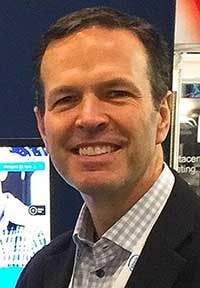Executive Insights: Jeff Klaus of Intel 1Q 2021
The Data Center Frontier Executive Roundtable features insights from industry executives with lengthy experience in the data center industry. Here’s a look at the insights from Jeff Klaus of Intel.
JEFF KLAUS, Intel Corp.
As General Manager of Intel Data Center Software Solutions, Jeff Klaus leads a global team that designs, builds, sells and supports Intel DCM, the only software that provides real-time, server-level data on the power and thermal conditions across a wide range of data center servers and other equipment. Provided as an SDK, Intel DCM middleware is integrated into Data Center Infrastructure Management (DCIM) consoles to increase data center power and thermal efficiency.
Since joining Intel in 2000, Klaus’ accomplishments have been recognized by multiple division awards. With a broad background in software solutions for the channel, client and SMB space, he has served as Director of Media Programs within Intel’s Digital Home Group, Entertainment Content Marketing Manager, Business Operations Manager, and Software Marketing Manager.
An accomplished speaker, Klaus has presented at such industry forums as Gartner Data Center Summit, AFCOM’s Data Center World, the Green IT Symposium, and the Green Gov conference. He has authored articles on data center power management in Data Center Post, IT Business Edge, Data Center Knowledge, Information Management and Data Centre Management. Klaus currently serves on the Board of Directors for the Green IT Council. Klaus earned his BS in Finance at Boston College and his MBA in Marketing at Boston University.
Here’s the full text of Jeff Klaus’ insights from our Executive Roundtable:
Data Center Frontier: In recent months we’ve seen disasters prompt rolling power outages in two of the largest data center markets, California and Texas. Are current approaches to data center infrastructure and operations sufficient? Or are there new strategies to consider in the face of energy security challenges? What are the new strategies?
Jeff Klaus: Power management is a challenge due to various uncontrollable factors including growth and sourcing, but there are ways to make better decisions and control operations in stressed situations. These items include monitoring at a subsystem level, looking for optimizing workload across deployed systems (to ensure utilization), and implementing power controls or power limiting to ensure utilization across whitespace stays within acceptable levels, particularly if running on backup power. Looking into how the IT demand can be shaped to help the datacenter as a whole remain functional is a strategy that we’ve seen deployed in future oriented data center strategies.
Data Center Frontier: Our industry is all about the data. But how good are our metrics? What are the strengths and opportunities in how the data center industry can measure and manage effectiveness? What’s going well and what’s missing?
Jeff Klaus: Getting granular data these days is essential to get in front of issues quickly. That can still be a challenge because of complexity and the different areas of knowledge each operation group has, but It’s really important to get information on the utilization and health of the assets deployed in the data center as well as there demand of DC infrastructure. We are seeing a convergence of thought on that perspective as well as a retooling of monitoring and orchestration tools to mine data from the IT device all the way up to the room and DC level. If you can’t see it, you can’t measure it!
“Getting granular data these days is essential. If you can’t see it, you can’t measure it!”
Jeff Klaus, Intel
Data Center Frontier: Data center tours and conferences are two key elements of doing business in this sector. What’s your sense of when these in-person activities can resume, and how they might be different?
Jeff Klaus: That will be different times in different locations and I think it’s impossible to pin a start date to it yet. I would say DC growth is still happening, DC floor space is still a very valuable commodity, and we look for that to continue for a long time.
Data Center Frontier: What are the top challenges in securing data center environments, and how do we address them in edge computing scenarios?
Jeff Klaus: In traditional data enters power, land, and construction costs still sit as the largest factors. With edge it can change the dynamic because you are deploying IT forward, so then it’s a matter of ensuring providing consistent power, environmental controls, and security. A big part of our growth is providing light weight, remote management solutions for these edge environments.
